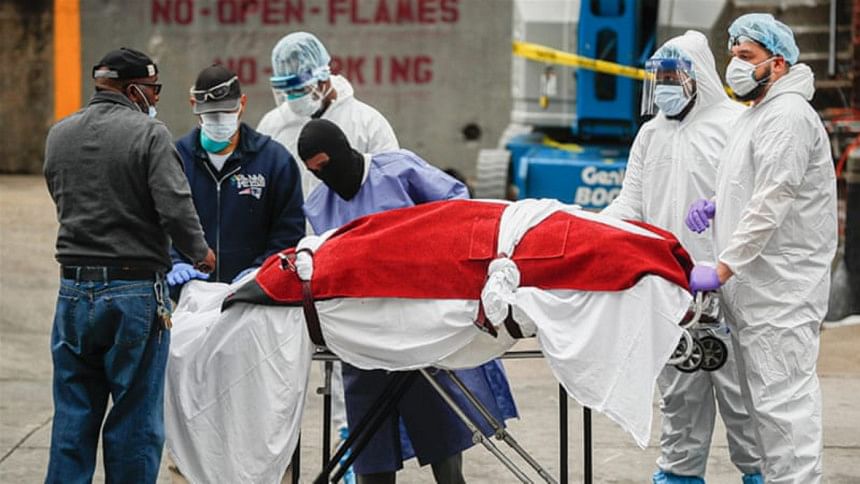Magical thinking in the time of Covid-19

I don't remember exactly when I heard about the 2019 version of coronavirus, Covid-19, but I do know it was during my travels in Asia this past January. Covid-19 was still local to China, as far as I knew, but having lived through swine flu (I vaguely remember chickens being slaughtered en masse in Bangladesh in response) and Ebola (which infected only 11 people in the United States), I engaged in a bout of magical thinking when I thought we—humanity as a whole, in general, and our world leaders, in particular—would be equally adept at fighting Covid-19. It turns out, this virus is far more insidious than anything we've seen before.
I thought we knew how to live through viral diseases: it primarily requires excellent leadership and cross-country multilateral coordination; re-allocation of resources to produce necessary instruments, including testing kits, vaccines, and cures needed by communities worldwide; and, public buy-in that happens through mass-messaging via government and non-government institutions, and more informally, through social networks, community leaders, and these days, social media influencers. More distant history provided comfort as well. Lessons from how tuberculosis was tackled include the import of community focused interventions such as "search, treat, and prevent" that were orchestrated collaboratively by governments, employers, and unions in the United States. But that too was magical thinking; we don't live in those times anymore. Unions, and relatedly workers, no longer have that kind of power, and after almost 40 years of neoliberalism we have, for the most part, governments so small that they are ineffective in handling anything that requires a unified intervention addressing the needs of people without prioritising profit maximisation. And those two are inherently mutually exclusive under global capitalism. With privatisation and NGOisation, we are now reliant on those sectors for aid and intervention in crises. That those sectors are hardly equipped to deal with a pandemic has become exceedingly clear. This is perhaps a key reason for the prolonged period of non-response from governments and the institutions that implicitly run the government under neoliberalism.
This is true across the world; after all, there are no libertarians in a pandemic—everyone wants big government.
What we saw when Covid-19 broke out of China and into other parts of Asia, Europe, and then the Americas, is that many heads of government chose to play ostrich, and then martyr; they started getting infected themselves (I'm thinking of Boris Johnson here), all the while sitting on a novel virus that gained momentum, resulting in a rising human cost that is, frankly, unimaginable, particularly at this time of scientific and medical innovation and discovery.
We know that crises make way for the stripping of rights. Under global capitalism, that amounts to deep violence and indignity of people who are made expendable. Across the globe, the expendables are those who are poor and considered minorities, those who already have limited rights, and those who work the most precarious jobs, without whose labour the world would cease to function. Yet, they are the ones who risk their lives to provide essential labour. In the US, more than 22,000 have died from Covid-19; reports suggest this is an underestimation. It surprises no one that emerging data show that most casualties are from historically oppressed groups—Black, low income, immigrants. For example, in Chicago, 70 percent of those who died are Black even when they constitute 29 percent of the population.
In Bangladesh, the number of deaths remained steady at five for weeks, then rose to 13, and then shot to 39. The disparity between the two nations is a function of underestimating the death count, even though both nations suffer from the same problem of not testing enough. Of the 39 that are known, most are middle-class; oppressed groups in the global South are often seen as faceless masses of people stripped of individuality and individual lives. They don't have access to medical care, and when they die, it is often attributed to poverty related health impairments. Even in death, they don't count. But this time, they might have to be, given the sheer number of fatalities that are being projected. A leaked memo from the United Nations estimates that two million will die from Covid-19 in Bangladesh.
We are being told that "healthy" people can survive Covid-19, thus responsiblising and shaming those with "underlying conditions" that increase the risk of mortality. Specifically, older adults and people with medical conditions such as diabetes, high blood pressure, and obesity are being told, directly and indirectly, that they are expendable; that had they been taking care of themselves, their risk of death would not have been so high. The mantra of personal responsibility is an underlying theme that can hardly be ignored, because that is what becomes the justification for inaction.
Such kinds of neoliberal rhetoric, when implicit, erases the social determinants of health—it is well documented that health disparities are produced by inequitable access to resources including healthcare, income, education, and the physical environment, as well as race, class, gender, disability, and other social identities. But that has never stopped politicians from blaming people for ill health, in the same way that people are blamed for the poverty in which they are forced to live. Such forms of erasure deny people the cause of their suffering; indeed, such erasure is undeniably a form of violence.
When such rhetoric is explicit, like that of Texas Lieutenant Governor Dan Patrick, who said "lots of grandparents" are willing to die to save the economy, it inspires all kinds of worrying questions, including about whether the pandemic is being used to engineer a change in demographics. It is, after all, low-income neighbourhoods that are worst affected by Covid-19. In these neighbourhoods, people don't have the luxury of "working from home" as social distancing mandates go into effect. This population includes many Bangladeshi immigrants in the United States who work jobs that have now been made essential. They choose between poverty and risking their lives. When they die, it is framed as a choice—because they are arguably aware of the risk they are taking—constrained as that choice is. They are then blamed for their own deaths because they tend to have socially produced underlying diseases such as hypertension and diabetes that increase their risk of being severely affected by Covid-19. Informal tallies indicate that over a hundred Bangladeshi immigrants in New York have already died of Covid-19.
And this is how we know that their lives don't matter: amid the Covid-19 crisis of which New York is the epicentre, New York Governor Cuomo is considering a plan that would cut Medicaid spending, the means-tested public health insurance programme that many workers rely on.
Then there are those who are even more marginalised: prisoners in densely populated jails, homeless people, and immigrants in detention centres. And in the time of coronavirus-inspired paranoia, our minds go to dark places. In particular, I am reminded of the Nixon era "benign neglect policy" or "do nothing approach" as we hear about the cases of Covid-19 in these populations. The humane thing to do would be to let prisoners out, let the migrants in detention centres through to find safety, treat all individuals like citizens, put the legalese aside, and provide them with healthcare.
They have a right to the same kind of healthcare as those who have been elected to represent them.
Nadine Shaanta Murshid, PhD, is Assistant Professor, School of Social Work, University at Buffalo, Buffalo, NY.

 For all latest news, follow The Daily Star's Google News channel.
For all latest news, follow The Daily Star's Google News channel. 



Comments